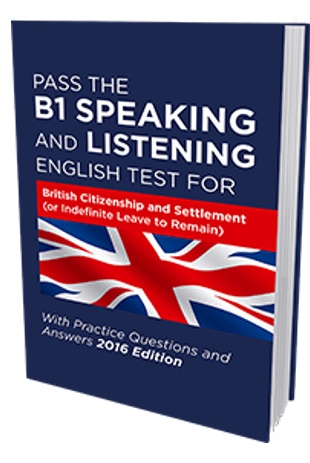SPEAKING AND LISTENING TEST
Passing the English speaking and listening test, is part of showing that you are ready to become a citizen or a permanent resident of the UK.
To apply for British Citizenship or Indefinite Leave to Remain you need to take a test at B1 level at a secure language centre.
There are two tests in which you can take: the IELTS Skills Test and the Trinity Grade 5 test. And in this blog, I will briefly discuss each test so you have a broader understanding of the types of tests used to determine British citizenship.
Now remember, you only need to take the test that tests your speaking and listening ability. You will not be tested on your writing at all.

TYPES OF SPEAKING AND LISTENING TEST
As mentioned, you can take either the IELTS B1 Life skills test, or the trinity GESE grade 5 test.
Both exams reflect typical situations you experience when you communicate with others in an English speaking country.
Both versions of the speaking and listening test can be used in your application for indefinite leave to remain (settlement) or citizenship. For both tests, the results last for 2 years. If you fail, there is no limit to how many times you can retake the test, so you can simply try and try again!
Only results secured at the test centre SELT (Secure English Language Test) will be accepted for you visa application.

SPEAKING CLEARLY
Another thing the interviewer will be looking for is how clearly you speak.
You need to speak clearly enough so the other person or people in the interview room can understand you.
You won’t be expected to speak with a British accent of course but if your accent is difficult to follow then this might have a negative effect on the interviewer.
Again practise your pronunciation by listening to someone talk English well and then repeat it in the same way.
Another thing is to try and put some feeling into what you are saying. If you speak in a very flat way or sound bored, then this won’t impress the interviewer either!
TOP TIPS!
So here are my ESSENTIAL tips to do well in the interview:

- In order to show that you are competent in English language, you need to be able to articulate yourself fluently and without too much hesitation.
- Try to avoid words such as ‘Erm’, ‘Umm’, ‘Hmm’.
- If you need to pause, take a deep breathe, and recollect your thoughts.
- Do not try to fill any awkward silences with irrelevance. This will lose you marks and the assessor will not be impressed.

- In your English and Listening test, you will be assessed on how well you are able to listen.
- You are not only being assessed on how well you can communicate in English, but how much you can understand other people.
- Make sure you pay attention to what is being said.
- Do not answer a different question.
- If you missed the question, ask them to repeat it.
- Don’t just give ONE word answers. This will make you look incompetent.

- Your interview for your Speaking and Listening test to remain in the UK acts as a conversation.
- If your interviewer makes a comment about something you have said, acknowledge this and respond accordingly.
- They are not there to watch you fail. They want to make sure you can communicate effectively.

- You can ask questions to the interviewer as well.
- If you are being assessed with someone else, make sure you get involved with them. Communicate with them and bounce off one another’s responses.

- It is good if you can recollect events from not only recently, but in the past, too.
- Try to remember lots of different and interesting events that you can talk about.
- The events you choose to talk about – make sure you know them really well.

- What are your plans for the future?
- Talking about your aspirations allows you to discuss what you wish to achieve and what you hope for the future.
- Try to come up with a range of English words. Do not use the same words over and over again.

- This should be relatively easy for you.
- Talk about things you like doing in your free time.
- This can be anything, so long as you feel confident enough to talk about this in great detail.

- You should also mention how long events lasted.
- This shows the assessor that you have thought about not only the event itself, but how long things lasted for and when events took place.
- This allows the assessor to see that you have more English vocabulary to offer.

- Like the previous point, try and talk about how many and how much.
- Again, this will allow the assessor to see that you have thought about things in greater detail.
For more information regarding the B1 Speaking and Listening test and other assessments, please check out our How2become B1 Speaking and Listening Guide.
